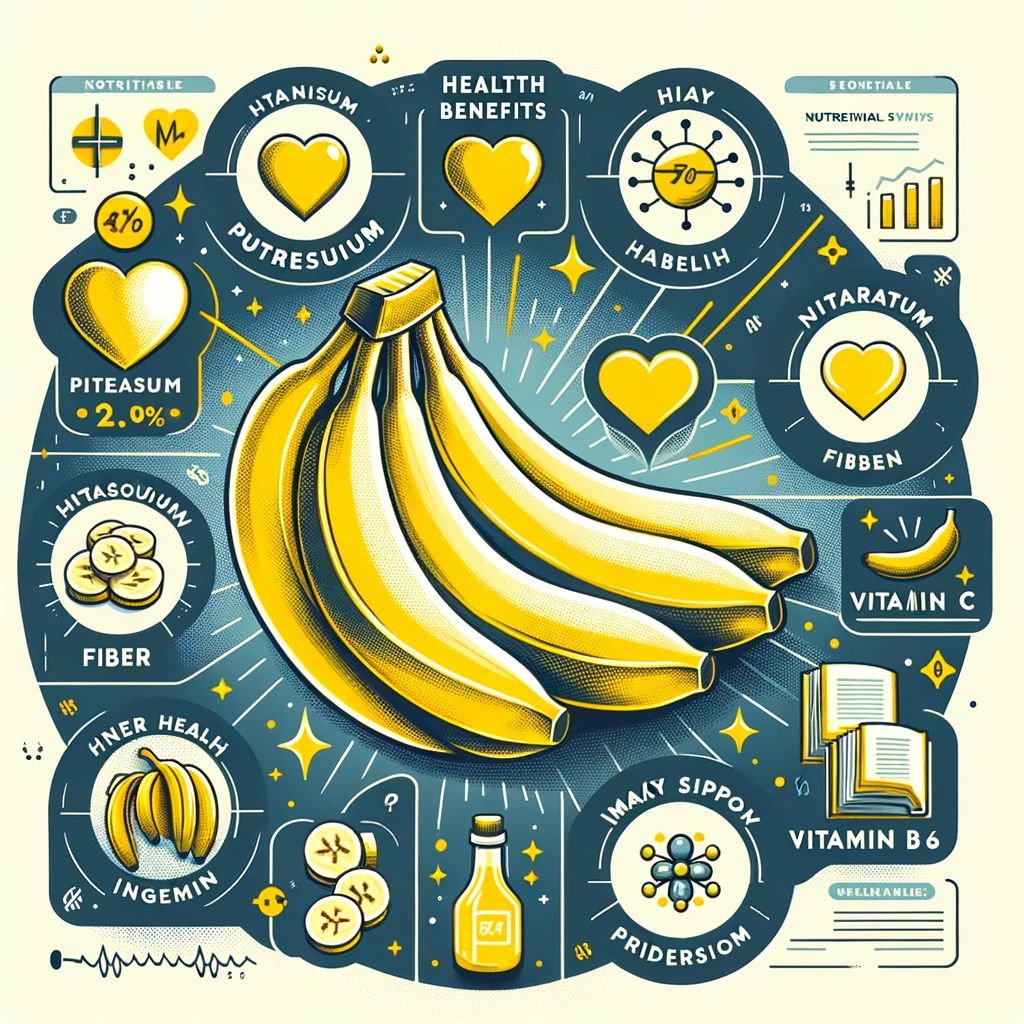Bananas are often seen as a simple snack, but they are actually a nutritional powerhouse that offers a wide range of essential vitamins and minerals. These yellow fruits are not only low in fat but also provide a good source of carbohydrates, making them a great option for boosting energy.
With a remarkable 422mg of potassium in just one serving, bananas are known for their high potassium content. They also contain vitamin C and magnesium, further adding to their nutritional value. Understanding the various components of bananas, such as their starch conversion into sugar as they ripen, can help optimize their health benefits.
In this article, we will explore the nutritional profile of bananas and uncover the hidden power within this humble fruit.
Banana Nutrition Facts
Bananas are a great source of essential nutrients. A medium-sized banana contains 105 calories, 27g of carbohydrates, and 1.3g of protein. They are also rich in potassium, with one serving containing 422mg. Bananas also contain vitamins C and magnesium. They are considered low in fat, with less than 0.5g of fat per medium-sized banana. The glycemic index for bananas ranges from 48-54. Carbohydrates in bananas include 3g of fiber and over 14g of naturally occurring sugar. As bananas ripen, the resistant starch (fiber) converts to sugar, resulting in a higher sugar content and lower fiber content in ripe bananas. For people with diabetes, it is important to count bananas as two carb counts or two carb choices.
Carbohydrates in Bananas
Carbohydrates in bananas provide a significant source of energy and essential nutrients. A medium-sized banana contains approximately 27 grams of carbohydrates, including 3 grams of fiber and over 14 grams of naturally occurring sugar.
As bananas ripen, the resistant starch (fiber) converts to sugar, causing a yellow banana with brown spots to have more sugar and less fiber than a green banana.
It is important for individuals with diabetes to count bananas as two carb counts or two carb choices.
Additionally, bananas are low in fat, with less than 0.5 grams per medium-sized banana. Consuming bananas with fat, such as peanut butter, can help unlock the nutritional benefits of the small amounts of fat-soluble vitamins A and K present in bananas.
Fats and Bananas
When considering the nutritional profile of bananas, it is important to acknowledge the role of fats in enhancing their health benefits. While bananas are low in fat, consuming them with sources of healthy fats can help unlock the nutritional benefits of the small amounts of fat-soluble vitamins A and K present in bananas.
Here are some key points about fats and bananas:
- Bananas are low in fat, with less than 0.5g per medium-sized banana.
- Pairing bananas with peanut butter, which contains monounsaturated and polyunsaturated fats, is a popular choice.
- Consuming bananas with fat can help improve the absorption of fat-soluble vitamins.
- Adding protein-rich foods like peanut butter to bananas can provide a more balanced and satisfying snack.
Including healthy fats in your banana consumption can contribute to a more nutritious and well-rounded diet.
Protein Content of Bananas
Enhancing the nutritional profile of bananas, considering the role of protein is essential. While bananas are not a significant source of protein, they still contribute a small amount to one’s overall protein intake. One medium-sized banana contains under 1.5g of protein. To put this into perspective, the recommended daily intake of protein for adults is around 46-56 grams. Therefore, bananas should not be relied upon as a primary source of protein, but rather as a complementary addition to a balanced diet. For those looking to boost their protein intake, pairing bananas with protein-rich foods like peanut butter can be a great option. Peanut butter contains approximately 8g of plant-based protein per two tablespoons, making it a popular choice to enhance the protein content of a banana snack.
| Protein Content of Bananas |
|---|
| Protein per medium banana |
| Under 1.5g |
| Recommended daily intake |
| 46-56 grams |
| Protein per 2 tbsp of peanut butter |
| 8g |
Vitamins and Minerals in Bananas
Bananas are packed with a variety of essential vitamins and minerals. Here are some key nutrients found in bananas:
-
Potassium: One medium-sized banana provides 422mg of potassium, which is about 9% of the daily value. Potassium is important for maintaining healthy blood pressure and supporting proper muscle and nerve function.
-
Vitamin C: Bananas contain a small amount of vitamin C, an antioxidant that helps protect cells and supports immune function.
-
Magnesium: Bananas also contain magnesium, which is involved in over 300 biochemical reactions in the body, including energy production and muscle function.
-
Choline: Choline is a nutrient that supports brain health and helps with the production of neurotransmitters.
Including bananas in your diet can help you meet your daily vitamin and mineral needs while enjoying a delicious and nutritious snack.
Frequently Asked Questions
Are There Any Other Fruits That Contain as Much Potassium as Bananas?
There are several other fruits that contain comparable amounts of potassium as bananas. One such fruit is the avocado, which provides even higher levels of potassium per serving.
Other fruits that are rich in potassium include kiwi, cantaloupe, and citrus fruits such as oranges and grapefruits.
Incorporating a variety of these fruits into one’s diet can help ensure an adequate intake of this essential mineral.
Can Eating Bananas Help With Weight Loss?
Eating bananas alone may not directly promote weight loss, as they are relatively high in calories and natural sugars. However, bananas can be a part of a balanced diet and contribute to weight management when consumed in moderation as a nutrient-dense snack.
They are low in fat and a good source of fiber, which can help promote feelings of fullness and regulate digestion. Incorporating bananas into a well-rounded diet and maintaining a calorie deficit are key factors in weight loss.
How Do the Nutritional Benefits of Green Bananas Compare to Ripe Bananas?
Green bananas have different nutritional benefits compared to ripe bananas. While green bananas are lower in sugar and higher in resistant starch, ripe bananas have higher sugar content and less resistant starch.
Resistant starch acts as a prebiotic, promoting gut health and aiding digestion. On the other hand, ripe bananas provide quick energy due to their higher sugar content.
Both green and ripe bananas offer essential nutrients like potassium, vitamins C and B6, and dietary fiber. Therefore, including a variety of both green and ripe bananas can provide a balanced nutritional profile.
Are There Any Negative Health Effects Associated With Consuming Too Many Bananas?
Consuming too many bananas can potentially lead to negative health effects. While bananas are a nutritious fruit, they are high in natural sugars and carbohydrates. Excessive intake of sugar can contribute to weight gain, increased blood sugar levels, and dental issues.
Additionally, consuming an excessive amount of bananas may cause digestive discomfort, such as bloating and gas, due to their high fiber content.
It’s important to consume bananas in moderation as part of a balanced diet.
Can Bananas Be a Good Snack Option for People With Diabetes?
Bananas can be a good snack option for people with diabetes due to their low glycemic index and high fiber content. The carbohydrates in bananas are slowly digested, resulting in a gradual rise in blood sugar levels.
Additionally, the fiber in bananas helps to regulate blood sugar levels and improve overall glycemic control. However, it is important for individuals with diabetes to monitor their portion sizes and consider bananas as two carbohydrate servings.
Pairing bananas with healthy fats, such as peanut butter, can further enhance their nutritional benefits.


Leave a Reply